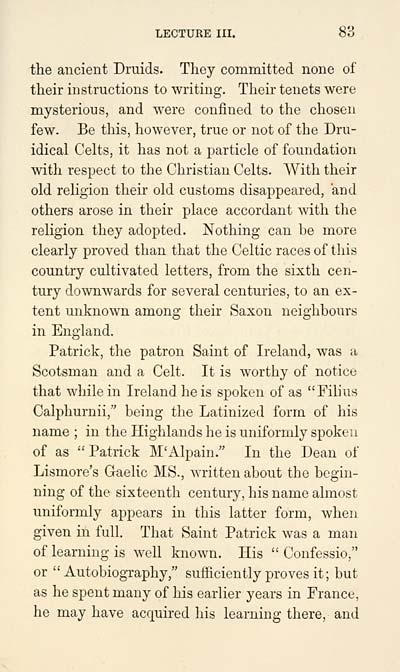Blair Collection > Celtic gleanings, or, Notices of the history and literature of the Scottish Gael
(95)
Download files
Complete book:
Individual page:
Thumbnail gallery: Grid view | List view

LECTURE III. 83
the ancient Druids. They committed none of
their instructions to writing. Their tenets were
mysterious, and were confined to the chosen
few. Be this, however, true or not of the Dru-
idical Celts, it has not a particle of foundation
with respect to the Christian Celts. With their
old religion their old customs disappeared, and
others arose in their place accordant with the
religion they adopted. Nothing can be more
clearly proved than that the Celtic races of this
country cultivated letters, from the sixth cen-
tury downwards for several centuries, to an ex-
tent unknown among their Saxon neighbours
in England.
Patrick, the patron Saint of Ireland, was a
Scotsman and a Celt. It is worthy of notice
that while in Ireland he is spoken of as "Filius
Calphurnii," being the Latinized form of his
name ; in the Highlands he is uniformly spoken
of as " Patrick M'Alpain.'' In the Dean of
Lismore's Gaelic MS., written about the begin-
ning of the sixteenth century, his name almost
uniformly appears in this latter form, when
given in full. That Saint Patrick was a man
of learning is well known. His " Confessio,"
or "Autobiography," sufficiently proves it; but
as he spent many of his earlier years in France,
he may have acquired his learning there, and
the ancient Druids. They committed none of
their instructions to writing. Their tenets were
mysterious, and were confined to the chosen
few. Be this, however, true or not of the Dru-
idical Celts, it has not a particle of foundation
with respect to the Christian Celts. With their
old religion their old customs disappeared, and
others arose in their place accordant with the
religion they adopted. Nothing can be more
clearly proved than that the Celtic races of this
country cultivated letters, from the sixth cen-
tury downwards for several centuries, to an ex-
tent unknown among their Saxon neighbours
in England.
Patrick, the patron Saint of Ireland, was a
Scotsman and a Celt. It is worthy of notice
that while in Ireland he is spoken of as "Filius
Calphurnii," being the Latinized form of his
name ; in the Highlands he is uniformly spoken
of as " Patrick M'Alpain.'' In the Dean of
Lismore's Gaelic MS., written about the begin-
ning of the sixteenth century, his name almost
uniformly appears in this latter form, when
given in full. That Saint Patrick was a man
of learning is well known. His " Confessio,"
or "Autobiography," sufficiently proves it; but
as he spent many of his earlier years in France,
he may have acquired his learning there, and
Set display mode to: Large image | Transcription
Images and transcriptions on this page, including medium image downloads, may be used under the Creative Commons Attribution 4.0 International Licence unless otherwise stated. ![]()
| Early Gaelic Book Collections > Blair Collection > Celtic gleanings, or, Notices of the history and literature of the Scottish Gael > (95) |
|---|
| Permanent URL | https://digital.nls.uk/76269789 |
|---|
| Description | A selection of books from a collection of more than 500 titles, mostly on religious and literary topics. Also includes some material dealing with other Celtic languages and societies. Collection created towards the end of the 19th century by Lady Evelyn Stewart Murray. |
|---|
| Description | Selected items from five 'Special and Named Printed Collections'. Includes books in Gaelic and other Celtic languages, works about the Gaels, their languages, literature, culture and history. |
|---|

